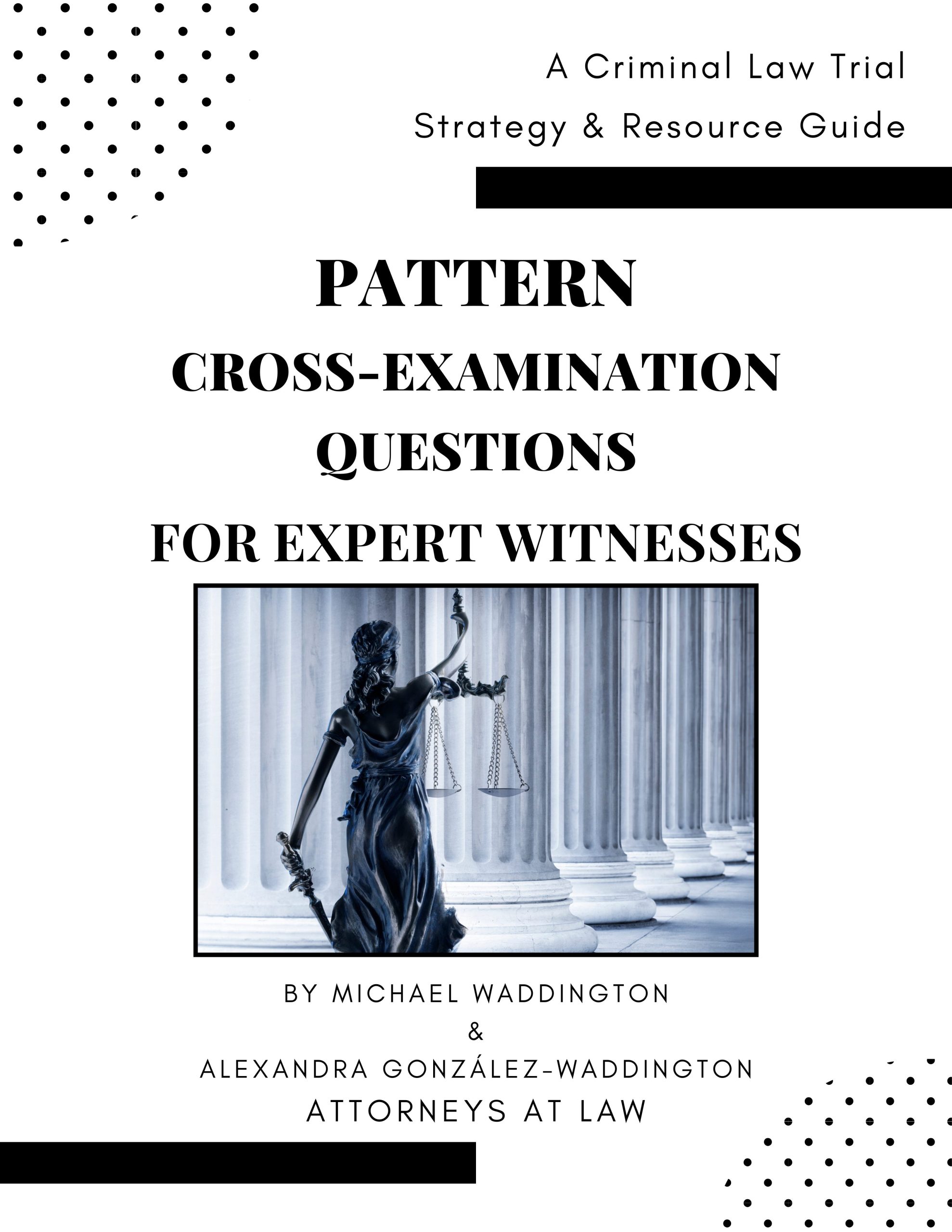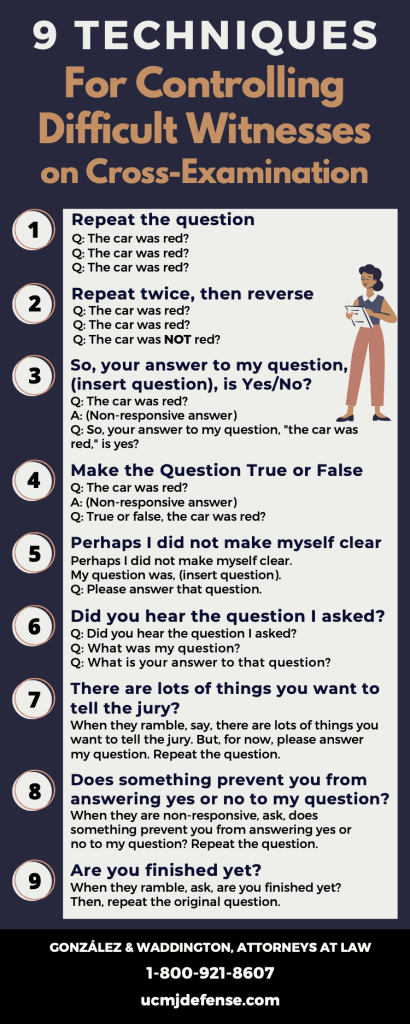Controlling Difficult Witnesses on Cross-Examination
FREE Cross-examination examples – Download our Cross-examination questions pdf
https://ucmjdefense.com/wp-content/uploads/2021/07/Pages-from-DNA-Pattern-Cross-FINAL.pdf
Pattern Cross-Examination for DNA and Biological Evidence
 Cross-examining the prosecution’s forensic expert in a criminal trial may make the difference between victory and defeat. More and more aggressive prosecutors are relying on forensic psychiatrists, toxicologists, and other experts to help obtain convictions.
Cross-examining the prosecution’s forensic expert in a criminal trial may make the difference between victory and defeat. More and more aggressive prosecutors are relying on forensic psychiatrists, toxicologists, and other experts to help obtain convictions.
Some expert witnesses will do whatever it takes, including misapplying scientific research to bolster the prosecution’s case. For the sake of justice, defense lawyers must be able to cross-examine and nullify forensic experts effectively.
Both sides prominently used forensic experts in the second Bill Cosby trial and Harvey Weinstein’s New York trial. Counterintuitive victim behavior experts played a vital role in the prosecution’s trial strategy in these cases. This book will help defense lawyers neutralize such experts.
Cross-Examination Techniques Videos Cross-Examination Sample Questions:
- Cross-Examination Techniques: Part 1
- Cross-Examination Techniques: Part 2
- Cross-Examination Techniques: Part 3
Michael Waddington is a criminal defense lawyer, Cross-examination expert, best-selling author on cross-examination techniques, and a trial consultant who defends cases worldwide. Mr. Waddington specializes in defending serious criminal cases including sex crimes, war crimes, military sex crimes, violent crimes, and white-collar crimes.
9 Techniques for Controlling Difficult Witnesses on Cross-Examination:
- Technique 1: Repeat the question.
- Technique 2: Repeat twice and then reverse.
- Technique 3: So, your answer to my question (insert question) is “Yes/No?”
- Technique 4: True or false.
- Technique 5: Perhaps I did not make myself clear.
- Technique 6: Did you hear the question I asked? What was it? What is your answer to that question?
- Technique 7: There are lots of things you want to tell the jury?
- Technique 8: Does something prevent you from answering yes or no?
- Technique 9: Are you finished yet?
To maintain witness control, you must ask good questions and follow these rules:
- Prepare and have your impeachment resources available (prior statements, learned treatises, journal articles, etc.);
- Remain calm and unemotional;
- Do not answer questions posed to you by the expert (they are the ones testifying, not you);
- Ask only leading questions;
- Insert only one new fact per question;
- Break cross-examinations into logical progressions towards specific goals;
- Gain and maintain witness control;
- LISTEN to their answer. If they dodge the question, DO NOT MOVE ON or REPHRASE!;
- Do not back down until the witness answers the question you asked; and
- Potty train the witness.
Cross-examination techniques – controlling difficult witnesses on cross-examination Infographic
Cross-Examination Expert: Subscribe to our YouTube Channel, The Trial Lawyers Notebook, for Cross-Examination Samples
He also teaches lawyers across the USA how to effectively cross-examine hostile witnesses and win trials. He has taught thousands of lawyers how to deliver closing arguments, powerful opening statements, and
Trial Strategy and Cross-examination Expert:
His bestselling book, The Art of Trial Warfare, I a legal strategy guide that is used by trial lawyers across the USA and taught at various law schools as part of their trial advocacy curriculum.
Cross-examination techniques
Michael Waddington has been reported on and quoted by hundreds of major media sources worldwide and has provided consultation services to CNN Investigative Reports, 60 Minutes, Katie Couric, ABC’s “Nightline,” the BBC, German Public Television, CNN, CBS, the 2010-2012 Golden Globe-winning TV series “The Good Wife,” and various other international media outlets.
We wrote several textbooks with cross-examination techniques and cross-examination question examples for a variety of fact patterns.
https://members.nacdl.org/criminal-defense-store
Best-selling author on Cross-Examination techniques, Closing Arguments, & Sexual Assault Defense
Michael & his law partner, Alexandra, wrote some of the best-selling books on cross-examination techniques, sexual assault defense, trial strategy, and closing arguments. All of our books contain closing argument samples and cross-examination questions examples.
- Pattern Cross-Examination for Sexual Assault Cases: A Trial Strategy & Resource Guide
- Pattern Cross-Examination Examples for DNA and Biological Evidence
- Pattern Cross-Examination Questions of Expert Witnesses.
All of these books are used by criminal defense lawyers across the United States. All feature cross-examination techniques, cross-examination questions, and cross-examination examples for criminal and civil lawyers.
Expert on Closing Arguments: Subscribe for Closing Argument Samples
Mr. Waddington’s book, Kick-Ass Closings: A Guide to Giving the Best Closing of Your Life, is the #1 rated book on closing arguments. It has been an Amazon bestseller since it was published in 2018.
Call 1-800-921-8607 to speak with a false military sexual assault defense attorney today.
Gonzalez & Waddington, Attorneys at Law
We fight false military sexual assault claims worldwide.
We defend military sex crimes and military sexual assault cases worldwide and state criminal cases in Georgia, Pennsylvania, New Jersey, and South Carolina. We also handle federal criminal cases across the country.
Trial Lawyers Notebook – Cross-Examination Techniques
Below is a transcript from the YouTube video Cross-Examination Techniques – Part 3: Controlling Difficult Witnesses on Cross-Examination
This is Section 3 of a 3-part lesson where you will learn Techniques 4 through 9 of the 9 Cross-Examination Techniques for Controlling Difficult or Hostile Witnesses
Cross-Examination Technique #4
True or False Questions
This is another fun one. I use this technique all the time. But before you do, you need to master techniques 1 through 3.
Suppose you ask a witness a question, and the witness does not answer your question.
They’re playing games.
Just make it a true or false question.
Sometimes you’ll get an objection, but there is nothing objectionable about this. It’s a simple question. True or false?
Like, “Your name is John?”
If they won’t answer that simple question, then say, “Your name is John. True or false?”
I like this technique because the jury is like, “Yeah, I get true or false. That’s how we were trained in school. True or false.”
If it’s a fact, then it should be true or false.
And if the witness is quibbling over whether a fact is true or false, they look like they are playing games. They are evasive and they look evasive.
Cross-Examination Example #1
Q: “After Johnny raped and tried to kill you, you returned to his house?”
A: “What was I supposed to do? He had my phone?”
Then you just say to the witness,
Q: “True or false, after he tried to kill you, you returned to his house?”
Then you often get “That’s true” or “False.” But if they keep quibbling with you, then they just look stupid.
This is where you shouldn’t get scared if they don’t say true or false?
Just stick to the nine techniques, and you will be fine.
And they are going to give you opportunities to riff off of this technique.
Q: “True or false, after he tried to kill you, you returned to his house?”
They might say, “I don’t know,” or give some non-responsive answer.
Just remember, this is a battle of credibility with the jury, and you’re now giving them a true or false questions.
This is third-grade stuff.
Q: “Did you return to the guy’s house or not?”
And that may be a way to ask that question at that point. And, the jury is going to be with you if you’re cool, calm, polite, and just trying to get the truth.
Q: “Did you return to his house after the attack – or didn’t you?”
From there, we escalate.
Cross-Examination Technique # 5
Perhaps I Did Not Make Myself Clear
If you get a quibbling non-responsive answer, you can move on to Technique #5.
Use this when the witness is blabbing on and on. This cross-examination technique is for a hostile witness who will not respond to a straightforward question.
Cross-Examination in a Criminal Case Example
You say,
Q: “After Johnny tried to kill you, you returned to his house?”
A: “What was I supposed to do? I left my phone there.”
Q: “Perhaps I did not make myself clear. The question I asked you was, ‘After Johnny tried to kill you, you returned to his house?’ What is your answer to that question?”
Then just stop.
Sometimes they just ramble, ramble, ramble, and say, “Did you understand what I’m saying, counsel?” or “Who do you think you are?”
Relax. You are winning the battle of credibility. The witness is impeaching themself.
Here’s a bonus cross-examination technique. I call it Impeachment by Crappy Personality. I use on a witness who may or may not be telling the truth, but their personality is so bad by the way they present themselves, the way they speak, and the way they answer questions – that the jury hates them. The jury doesn’t want to listen to them anymore.
If you are credible, you can do this with many witnesses who are just bad witnesses because they’re generally not good quality people. They’re just negative, bad people.
Cross-Examination Civil Case Example
So the same thing goes with the Doctor’s question.
Q: “You found Mercury in the water?”
The Doctor’s answer is non-responsive.
Q: “Doctor, perhaps I did not make myself clear. My question to you was, “You found mercury in the water?’ What is your answer to that question?”
Stop. Put the ball in their court.
Cross-Examination Technique # 6 –
Did You Hear the Question I Asked?
What was it?
What was your answer to that question?
Here’s how you use Technique # 6.
You ask the question with one new fact per question.
Q: “After Johnny tried to kill you, you returned to his house?”
The witness gives a non-responsive answer, “blah blah blah.”
Then you say to the witness,
Q: “Mr. Jackson, what question did I just ask you?”
Wait till they respond.
Sometimes they say, “I don’t know.” Usually, they will say. “Yes.”
So you continue,
Q: ” Mr. Jackson, what is your answer to that question?”
Or, you say,
Q: “Mr. Jackson, what DID I ask you?
What was the question I just asked you?”
If they know the question, then have them repeat it. Then say,
Q: “What is your answer to THAT question? ”
Or you might have this pattern.
Q: “Did you hear the question that I asked you?”
A: ” Yes.”
Q: “What did I ask you? What was my question?”
And they say, “I don’t know.” Or they give some answer, then you say.
Q: “No, my question is X. What is your answer to that question?”
And this puts him in check.
Cross-Examination Technique # 7
There Are Lots of Things You Want to Tell the Jury
This technique is used mainly with experts and people who just can’t shut their mouths.
By the time you get to number seven, the jury should hate this witness and not be listening to them.
Maybe for the comedic value, they’re listening to the witness, but they’re thinking, “This person’s a bum. They’re not answering the questions, or they’re hiding something.”
So you ask the doctor,
Q: “You found Mercury in the water?”
A: “Blah, blah, blah, blah, blah, blah.” and they go on and on, not answering the question.
Whether they found mercury in the water should be pretty straightforward, assuming that that fits your pack pattern.
Then you say,
Q: “Doctor, I understand there are many things you want to tell the jury. But my question was, ‘You found mercury in the water?’ What is your answer, Doctor, to that question?”
And if you get “blah, blah, blah,” then you can use other techniques.
But the point is, you’re impeaching them because they won’t answer the question.
They’re losing credibility.
Cross-Examination Technique # 8 –
Does Something Prevent You from Answering Yes or No?
Use this technique when you’re asking a question, and they won’t give a yes or no answer.
This cross-examination technique is a higher escalation.
Q: “Does something prevent you from answering yes or no to my question?”
I know the rules. People say, “Don’t ask a question you don’t know the answer to.”
And you might get a crazy answer here.
But at this point, you don’t care. Just ask the question.
Q: “Is there something that prevents you from answering my question yes or no?”
Use this after they just can’t give a straight answer. And, use one new fact per question, and they are facts.
Cross-Examination Technique # 9:
Are you finished yet?
This technique is the ultimate escalation.
I use this when the witness is not hurting me but just blabbing on and on and on.
Or when I ask the question, and they don’t answer the question.
Here is an example from a case I did.
This guy met a woman at a bar, and they hung out all night. They had a couple of drinks and left the bar together, holding hands. They hooked up, and then they dated for a little bit.
A month or two later, she accused him of assaulting her. The bartender remembered them because they were all over each other at the bar, and he saw them leave the bar holding hands.
Our point was that he wasn’t a stranger who followed her home like she claimed. They actually met at the bar, and when they left, it seemed consensual, at least from what the bartender could see.
But when the bartender testified, it was clear that he didn’t want to be there and was hostile.
So I asked him,
Q: “When they left the bar, they were holding hands?”
A: “There were a lot of people coming and going out of the bar that night. I mean, it was a Friday night. We were so busy. We were just trying to keep our heads above water. Blah, blah, blah.”
This witness had already testified to the police earlier that he saw them holding hands. He told us in a pre-trial interview that he saw them holding hands.
For some reason, he was fighting us.
So we asked him,
Q: “When they left the bar, they were holding hands?”
A: “That was a long time ago. It was a late night. The bar was packed. It was cold. My manager asked me to help tend bar.”
All this is non-responsive to the question.
Q: “When they left the bar, they were holding hands?”
A: “Blah, blah, blah.”
And at this point, I said, let him blab on about how tough his life was, how many jobs he’s had since, and whatever he was blabbing about.
And I said,
Q: “Anything else you’d like to add?”
Then he blabbed on a little more.
Then I simply asked,
Q: “Are you finished?”
Now that’s being sort of snarky, but at this point, the jury was fed up with this person.
And so, the jury was with me on this,
Q: “Are you finished? ”
A: “No, blah, blah, blah.”
And then I repeated,
Q: “When they left the bar, they were holding hands?”
At that point, the witness had said everything they were going to say. They blabbed on at this point we said,
Q: “When questioned by the police a month after the incident, you told the police that when they left the bar, they were holding hands?”
Then we moved into a different type of impeachment.
And that is you use Technique # 9.
Practice. Practice. Practice. And Have Fun.
You need to practice all of these techniques.
Practice these with your family members.
Practice with your friends.
Practice on your kids.
Practice with your colleagues.
Practice them.
Memorize them.
Practice them in depositions.
Practice them in court.
Practice them in hearings.
Practice in front of the judge.
Practice in front of the jury.
Remember, maintain your credibility.
But more importantly, have fun.
Going to trial should not be the biggest stress in your life. If it is, you’re in the wrong line of work, and you need to loosen up.
You should be having fun.
Cross-examining is a job, but I have a ton of fun of in my cases.
They’re very stressful, and they’re high stakes, but I have fun doing them.
There’s nowhere else I would rather be professionally than cross-examining witnesses, giving closing arguments, and trying my cases.
So have fun at it.
Once you master the rules, your anxiety will go way down.
And also prepare, prepare, prepare.
“We are what we repeatedly do. Excellence, then, is not an act but a habit.” – Aristotle.
Practice. Practice.
Train. Train.
If you’re a lawyer or trial lawyer, whether it’s your first case or last – you need to be prepared.
You have a duty to your clients to be prepared.
It makes you feel better and perform better.
It makes our system work better.
And, it makes it a lot of fun.
These are the nine cross-examination techniques for controlling hostile or difficult witnesses.
They work for me. And, if you practice them, they will work for you.
I hope you enjoyed them.
If you write me a quick email, just let me know you watched the video and read the lessons, and I’ll send you a free copy of The Art of Trial Warfare.
If you have any questions or want to check out any of our other courses, please subscribe below.




